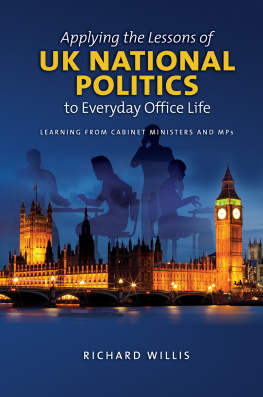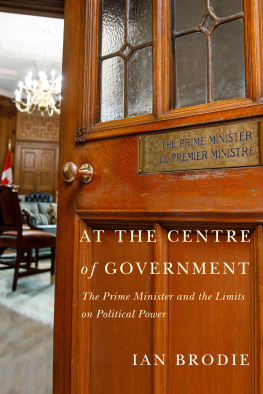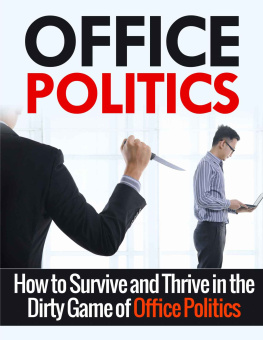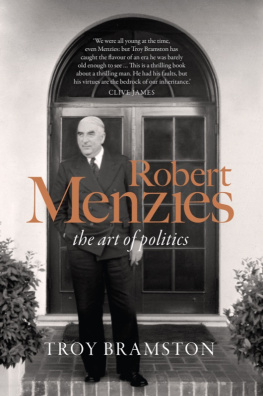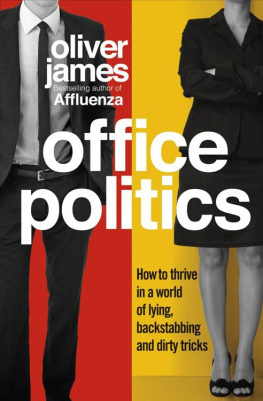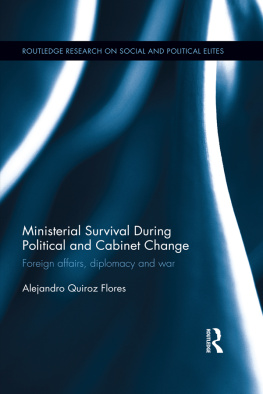Applying the Lessons
UK NATIONAL
POLITICS
to Everyday Office Life
This book is dedicated to
my mother and sister
Applying the Lessons
UK NATIONAL
POLITICS
to Everyday Office Life
LEARNING FROM CABINET MINISTERS AND MPs
RICHARD WILLIS
Copyright Richard Willis, 2019.
Published in the Sussex Academic e-Library, 2019.
SUSSEX ACADEMIC PRESS
PO Box 139, Eastbourne BN24 9BP, UK
Ebook editions distributed worldwide by
Independent Publishers Group (IPG)
814 N. Franklin Street
Chicago, IL 60610, USA
ISBN 9781845199883 (Cloth)
ISBN 9781782846284 (EPub)
ISBN 9781782846291 (Kindle)
ISBN 9781782846307 (Pdf)
All rights reserved. Except for the quotation of short passages for the purposes of criticism and review, no part of this publication may be reproduced, stored in a retrieval system, or transmitted, in any form or by any means, electronic, mechanical, photocopying, recording or otherwise, without the prior permission of the publisher.
British Library Cataloguing in Publication Data
A CIP catalogue record for this book is available from the British Library.
This e-book text has been prepared for electronic viewing. Some features, including tables and figures, might not display as in the print version, due to electronic conversion limitations and/or copyright strictures.
Contents
Acknowledgements
Introduction
Elective Dictatorship
Interviews: Lord Baker and Lord Blunkett
Limitations on Power
Exercises of Power
Change and Reform
Case Study: The John Lewis Partnership
Appendix
Interviews with Lord (David) Blunkett and Lord (Kenneth) Baker
Acknowledgements
The cover illustrations for print and electronic usage are reproduced by permission of 123RF GB Ltd (London).
The photographers: Adrian Hillman (office workers; stock number: 9565798); Aberbran Studio (10 Downing St: stock number: 55161730); Vichaya Kiatying-Angsulee (Parliament: stock number: 13405680).
Introduction
This book takes an enterprising approach to our knowledge of office politics in that it is based on findings from interviews of two former Cabinet Ministers and a survey of UK MPs. The essential purpose of these investigative tools is to give an account of the politicking of government in the British political system and the ways in which these findings have a bearing on office politics, a process to which so many of us are subject in our daily lives. The intention is to arm the office worker with defensive and offensive tactics in order to establish themselves in the life of the office. I show that, while a more conciliatory and democratic approach is feasible, built on goodwill, helpfulness and humanitarian values, it may be less effective.
In the background is always the British welfare state, founded after the Second World War. Housing rented from the state, the National Health Service, social security, free education and many other elements were brought in to prevent a revolution by the working classes the welfare state was seen a way to avoid a civil war, but the aim was also to reward the citizens of Britain for all the losses and sacrifices made during the war. It is necessary still to take on board both perspectives.
Office politics may be defined here as actions, attitudes, opinions, strategies and behaviour geared to promoting oneself ahead of other workers in the workplace. An alternative is the practice of democratic ideals and motives to instil a sense of fair play and harmony in accomplishing ones career aims. Within the office it is clear that the employer can have a soft voice but carry a big stick.
Qualifications and Experience
My experience of offices consists of ten years employment in the law department of a US multi-national, which held ten qualified barristers and solicitors, two legal assistants, four secretaries and an office manager. My duties were to run the law library, to administer the lawyers continuing professional development in accordance with Law Society regulations, to report monthly to Houston in the USA on lawyers outside counsel fees, and other associated tasks. I also worked in central London, including the City, for a year, and in financial administration at a London teaching hospital for 18 months. I have worked in administration for the Cambridge University Press, the TEC National Council, the Bank of Scotland, The Civil Service, the Battersea Bedsit Project, Battersea Technical College, the Probation Service and the London Borough of Lambeth. I would hope that these experiences have added to my ability to examine and discuss some of the essentials of office politics and the actions of those in the workplace.
Much of the inspiration for and interest in this book comes from the acclaimed academic and civil servant Maurice Kogan. He was my tutor, friend and mentor while he was Professor of Government and Social Administration at Brunel University, a post he held for more than 25 years before an outstanding contribution in the Civil Service. While reading political science, I elected, in the final year, to do Kogans module on politics and policy-making. As an undergraduate, I met Shirley Williams, Ken Livingstone, Sir Keith Joseph, Jim Callaghan, Dr David Owen, Cecil Parkinson and Professor Tony Travers. Kogan was particularly expert on the politics of education as evidenced by his publication recording conversations with Edward Boyle and Anthony Crosland (both former Education Ministers). I consciously used the model employed by Kogan in his interviews and asked questions similar to those posed by Kogan in his analysis.
My interest in contemporary politics was initiated when I became an advisor to David Camerons team reviewing the public services when the Conservative party was in opposition. My services were called upon largely as a result of my work in teacher education, including 11 years as a senior researcher based at Roehampton University, as an advisor to the Qualifications and Curriculum Development Authority and as the author of The Struggle for the General Teaching Council. I presented my thoughts and observations on the teaching profession in Parliament to Stephen Dorell, Health Secretary under John Major, and Baroness Pauline Perry. We considered proposals intended to raise the professions importance, to counter poor professional standards in the past and to modernise and reform Britains education services. I also interviewed Charlotte Leslie MP about her role in supporting institutional reform, such as the setting up of the Chartered College of Teaching in January 2017.
Oral Testimony
My exposure to oral testimony was reinforced when I was a research associate at Cambridge University for a history project funded by the Leverhulme Trust where, working with two dons and two senior researchers, I contributed to the interviewing of over 100 former teachers. The study shed much new light on how practical and professional goals were questioned within the broader national and local policy objectives for teacher training.
Oral testimony, of the kind given in the Appendix to this book by Lord (Kenneth) Baker and Lord (David) Blunkett, allows the reader to learn more about the perspectives of individuals, information that might not otherwise appear in historical records. Oral history also provides a great opportunity to interact with others, and researchers and interviewees join together in conversation about a shared interest, something that can be very rewarding both for those interviewing and those being interviewed. Efforts were made to provide due weight to political affiliation, experience and the extent to which policies have impacted on politics since the end of the Second World War. I anticipated that the two former Cabinet ministers selected for the exercise could testify to particular aspects of decision-making and power in government that would be relevant to building on and increasing our knowledge of office politics. The interviewees offered a rich source of data and this was supplemented with material from written publications, including diaries and memoirs. The survey that I draw on in this book provided important data about MPs who were or had been engaged in the political process and who were able to comment on their own office and administrative experience. The outcome was a vast amount of information that could be applied to an analysis of office politics. The names of surveyed MPs are not revealed as at the outset it was agreed that they would remain anonymous. It was felt that in this way the MP could be more honest and would not be castigated if they had not followed the party line.

